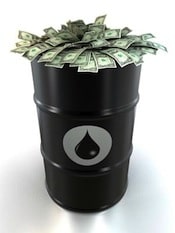As both oil industry profits and gas prices continue to rise, Congressman Bruce Braley (D – IA) believes that it is time to end the billions of dollars worth of subsidies that the United States hands out to oil companies on an annual basis. In his proposed Clean Energy Jobs bill, Braley would end the tax breaks and other subsidies that flow to the oil industry, and use that money instead to create clean energy jobs, invest in biofuel production, and pay down the national debt.
These oil industry subsidies are nothing to scoff at. In 2005, then-President George W. Bush authorized a total of $32.9 billion worth of new subsidies for the industry over five years, bringing the annual total of their subsidies to a staggering $39 billion. The new subsidies were put in place at a time when Americans were paying the highest price for gasoline at the pump in history, which coincided with the largest oil company profits to date.
To put the oil industries’ subsidies in perspective, T.J. Scolnick wrote in a DeSmogBlog piece last month in response to President Obama’s State of the Union Address:
The President proposed $302 million for solar energy research and development (up 22 percent); $123 million for wind energy (a 53 percent increase); and $55 million for geothermal energy (up 25 percent). But fossil fuels subsidies are holding back growth in burgeoning clean energy industries, which face a momumental challenge to compete with entrenched industries that receive far greater government subsidies.
Oil industry subsidies were established to help the industry meet the energy demands of the nation, and are meant to be used to increase production, exploration, and innovation. However, as fossil fuels are becoming more and more expensive to produce and causing increasing damage to the environment, the subsidies no longer provide a tangible benefit to the American people. The price of gasoline and consumer products continues to soar, putting a heavy burden on American families, and the only apparent benefits are going to the oil industry’s bottom line, as evidenced in their record profits even in a tough economy.
Investing these billions of dollars of subsidies into clean, renewable sources of energy would not only create new industries offering much-needed jobs, but would also help reduce the pollution associated with dirty fossil fuels that threatens public health and the global climate.
Congressman Braley’s Clean Energy Jobs bill is in the early stages of the legislative process, and faces tough political hurdles with a Republican-controlled Congress. While the wisdom of Braley’s vision for clean energy and job creation is clear, the chances of the bill being brought to a full House vote remain slim. Once again, politics stands in the way of real progress.
Subscribe to our newsletter
Stay up to date with DeSmog news and alerts







